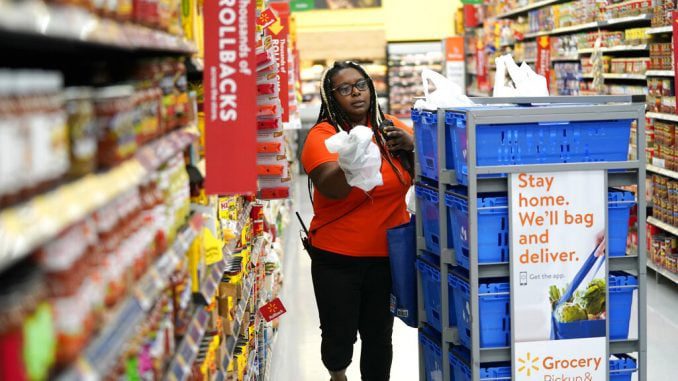
RALEIGH — In the midst of the global panic over coronavirus, North Carolina consumers have been buying products off the shelves at a frenetic rate, pressuring retailers and their suppliers to make goods available quickly and in large quantities.
“Grocery is going at full capacity right now — as hard as they can go,” Andy Ellen, president of the North Carolina Retail Merchants Association, told NSJ. “It is not a supply chain issue. It is a demand issue. People are just buying way too much.”
Ellen said, other than a few specific items, like cleaning supplies and toilet paper, consumers should not have trouble finding anything they need. It may not be the brand they are used to, but there should be an equivalent item.
“I think you’re seeing a scenario where this is probably the biggest demand we’ve seen on grocery stores and food supply in a long time,” Ellen said, saying it has mirrored the lead up to a hurricane, but sustained over a much longer time. “This is why you’ve seen grocery stores reduce their store hours, so they can get product in, get the shelves clean and restock those items without customers pulling things out of the boxes as trucks are coming in.”
An area where the NCRMA does see concern, though, is having enough truck drivers to get the products to distribution centers and to stores.
“The only place we’re really struggling right now is there is a shortage of commercial drivers,” Ellen said. “So trying to make sure you’re pushing the product that is getting to the distribution centers and the distribution center to the retailer, those trucks are going at full capacity right now.”
Crystal Collins, president of the NC Trucking Association, told NSJ they were working as fast as they could to deliver within the guidelines they were given.
“One of the challenges we’re having from the state is when they closed 60 DMV locations; that eliminated locations for drivers that had their CDL up for renewal,” Collins said. “There are over 25,000 truck drivers in the state who have a CDL that is going to expire between April and July. They went from 115 DMV offices to 52. So you’ve got drivers all over the state who don’t have immediate access to a DMV office, and on top of that you have to meet by appointment only.”
Ellen agreed, saying, “There’s been a shortage of commercial drivers because of demand, but the inability to renew the CDLs is also going to make it a little more difficult.”
Collins said the skills tests to add new drivers are still going, but those are by appointment only as well.
Rep. John Torbett (R-Gaston), co-chair of the House Transportation Committee and a member of the newly formed House Select Committee on COVID-19, said the issue with CDL renewals is on their “laundry list” of items to accomplish when they come back for session. He did not know whether there would be a special session called in the coming days or whether they would wait until the planned short session in late April.
“We’ve always had that problem,” Torbett told NSJ, conceding the CDL renewal process needs an overhaul in general.
But Torbett did say that they’ve been working to change what they can do without coming back into session. The CDL change would require a vote, so Cooper or his DMV cannot make that change without the legislature.
“We’re trying to remove and lighten any restrictions out there to get through some red tape,” Torbett said. “We’re hearing back from a lot of the grocery suppliers, from their truckers, saying it’s worked and they’re able to do what they need to do to get food back on the shelves.”
Overall, Collins said the drivers have been able to meet the challenge, even if there is more volume than usual. One thing that’s helped is drive times have gotten a lot better with fewer cars still on the road. But drivers are having one unforeseen difficulty while on the road — finding a place to get a meal. Trucks of that size are not allowed to go through drive-thrus, and the dining areas inside are shut for customers.
“If you see a truck driver sitting in a parking lot, offer to purchase his food when you go through the drive thru to help him out,” Collins said, adding that law enforcement has often helped in that way and that drivers have reported people holding up signs thanking them for keeping the supply lines going.
In addition to Collins encouraging the public to support her members, the state’s truck drivers, Ellen asked that the public be aware of the retailers in their area — and not just the grocery stores, but other businesses too.
“Support your local retailer,” Ellen said. “You want them to be there. You want that storefront to be bright and shiny when we get back to normal. So keep supporting them whether that’s buying a gift certificate or ordering something from the local person online. That’s what’s going to help keep those people in business, the people who support your community all year long. A lot of the ones that are working really smart and really hard will come out the other side; other ones it’s going to be more difficult on.”



